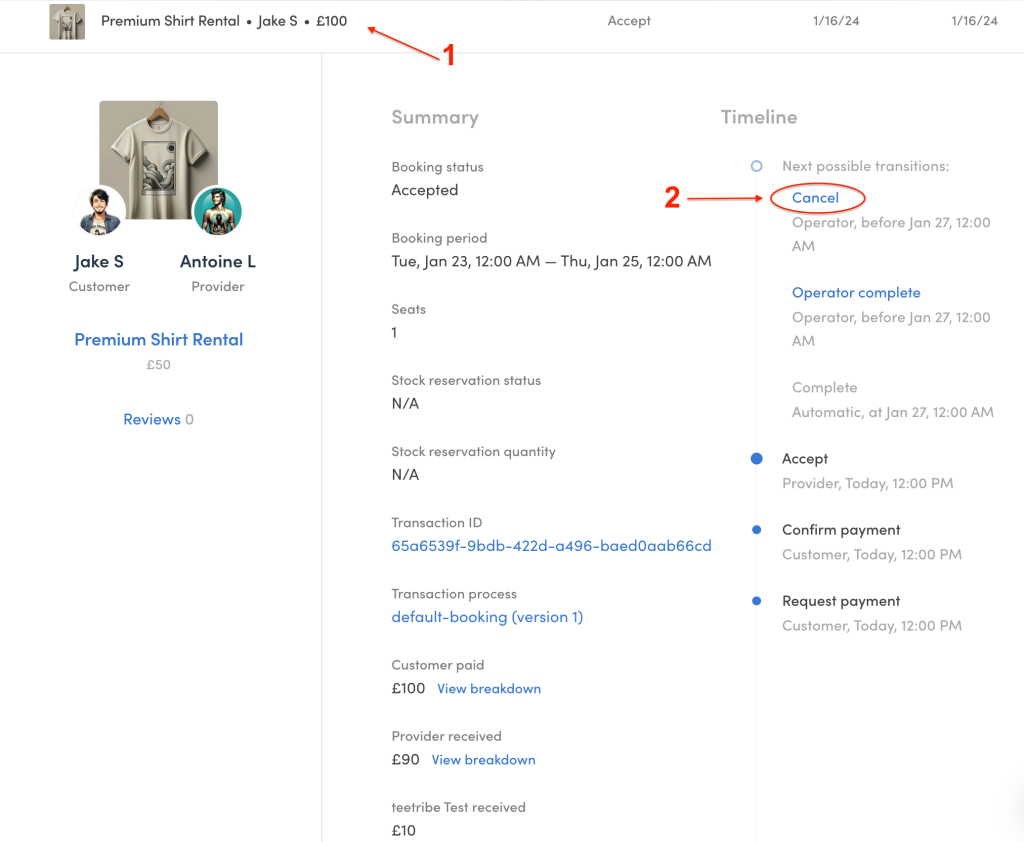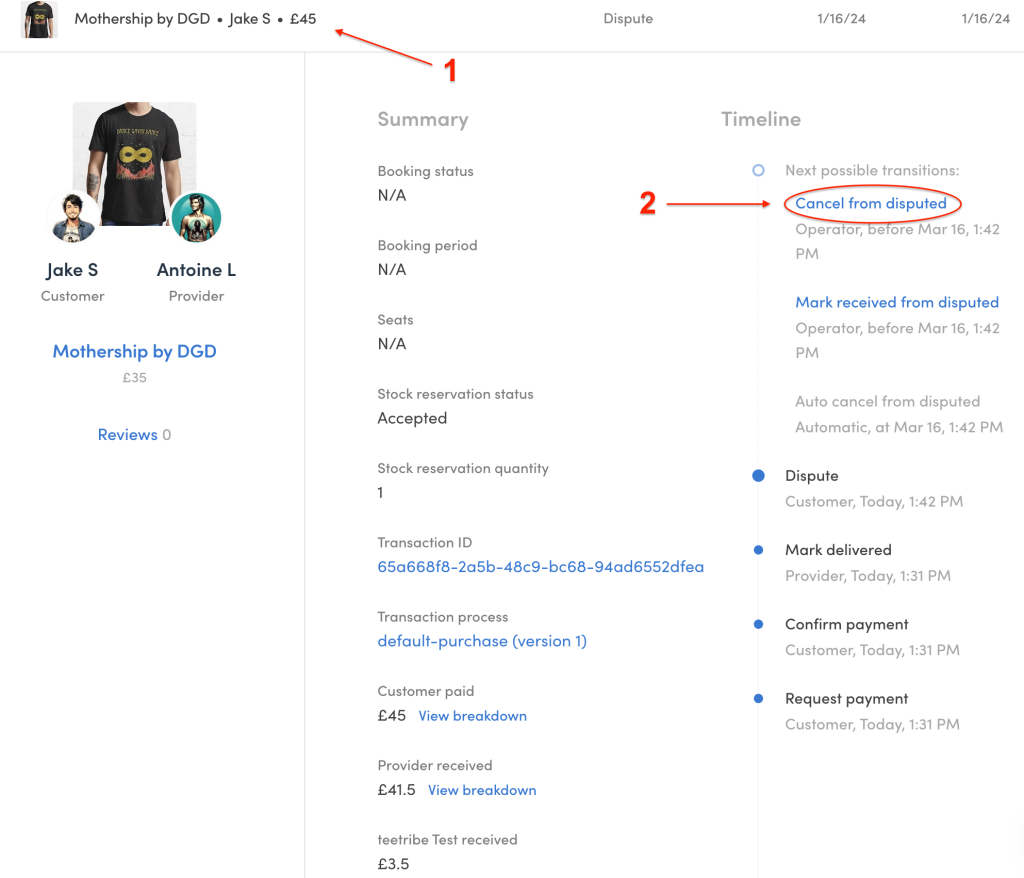Introduction
Running a successful online marketplace involves more than facilitating smooth transactions—it also requires managing the bumps that come with human interactions. Disputes, refund requests, and cancellations are inevitable, especially in service- or product-based platforms where expectations may vary between users. If not handled properly, these issues can erode user trust and damage your brand. That’s why having a clear, structured, and user-friendly approach to dispute resolution and refunds is critical to your Sharetribe marketplace’s long-term success.
Sharetribe provides tools for handling disputes, refunds, and cancellations within your marketplace. Users can initiate disputes after a transaction is marked as “Shipped”, creating a clear post-fulfillment window to raise concerns. Marketplace operators have the flexibility to intervene by canceling transactions and issuing partial or full refunds—especially effective before the transaction is marked as “Completed”. This allows for responsive and fair resolution processes.
Additionally, Sharetribe handles subscription cancellations seamlessly: when a user cancels their subscription, access to the marketplace remains active until the end of the current billing cycle, ensuring no disruption in service and preventing premature deactivation. Combined with admin oversight and integrated messaging, these features help maintain user trust and operational transparency across your marketplace.
How to manage disputes, refunds, and cancellations on Sharetribe?
1. Why You Need a Clear Dispute and Refund Policy
One of the biggest mistakes marketplace owners make is not having a well-defined dispute resolution or refund policy in place. Without clear guidelines, buyers and sellers are left uncertain about what to expect if a transaction doesn’t go as planned. This can quickly erode trust in your platform.

A clear policy helps set expectations from the beginning. Buyers know under what conditions they can request a refund, while sellers understand their responsibilities regarding quality, delivery, or service fulfillment. It minimizes miscommunication and ensures both parties operate under the same rules.
Such policies also provide legal and operational protection for the marketplace operator. If disputes arise, you can point to predefined terms agreed upon at checkout, reducing your liability and making resolutions faster and more consistent.
In Sharetribe, you can showcase these policies clearly across your platform—particularly in your Terms of Service, FAQs, and even the Checkout page. This transparency builds user confidence and can deter dishonest or exploitative behavior.
Example:
Imagine you operate a rental marketplace for camera gear. Your policy states that users can cancel a rental up to 48 hours before pickup for a full refund, and that any damage claims must be submitted within 24 hours of return. You clearly display this on your product pages and booking screen. When a dispute arises, you’re protected by your documented policy and can resolve the issue quickly and fairly, maintaining trust with both parties.
2. Common Scenarios That Lead to Disputes or Refunds
Understanding the typical triggers that cause user dissatisfaction is crucial for preventing disputes before they escalate. These scenarios often arise from unmet expectations, service failures, or unclear communication—and knowing them allows you to design stronger policies and support processes.
One of the most frequent issues is when a product or service doesn’t meet expectations. For example, a customer might book a photoshoot through your marketplace, but the final images don’t reflect the quality promised in the listing. Without a clear refund policy, this can quickly turn into a negative review or a chargeback.

Last-minute cancellations by providers also create a bad experience, especially if the service was time-sensitive—like a booking for a tour guide, personal trainer, or event vendor. When this happens, buyers expect fast refunds or a substitute, which requires a solid cancellation and refund protocol.
Miscommunication is another root cause of disputes. This can include disagreements about delivery dates, quality standards, add-on services, or what exactly is included in the price. Ambiguities in listings often lead to mismatched expectations.
Double bookings or unresponsive vendors are also major friction points. When two customers book the same timeslot or a seller doesn’t reply after payment, it creates uncertainty and increases the need for manual resolution by the marketplace operator.
By mapping these scenarios, you can proactively build workflows, FAQs, and automated notifications to guide both buyers and sellers through each stage of the transaction. This ensures that if issues arise, your platform is prepared with clear resolutions, keeping user trust intact.
3. Building Automated Cancellation Workflows in Sharetribe
As your marketplace scales, manually managing cancellations can lead to delays and errors. Sharetribe’s transaction process editor (available in the advanced edition) lets you automate this entire process, ensuring smooth cancellations for users and vendors alike.
You can define who can cancel and under what conditions—for example, users may cancel up to 48 hours before the service, while vendors can cancel in case of emergencies or inventory issues. You also control how refunds are handled, whether they’re full or partial, and when they are triggered.

The system can also trigger automated status updates—changing the booking to “Canceled”—and send real-time email or in-app notifications to all parties involved. These alerts can include custom messages with your policy, refund timelines, or next steps.
Example: If your marketplace offers local tours, you can configure a rule that allows users to cancel up to 48 hours in advance. Once they cancel, the system refunds the amount, updates the transaction status, and notifies both the buyer and the tour guide—no manual steps required.
4. Using Transaction States for Transparent Refund Management
In Sharetribe, every transaction moves through a series of well-defined states such as pending, preauthorized, paid, confirmed, refunded, or declined. These transaction states are more than just labels—they are control points that allow you to create a transparent and accountable refund process.
You can configure your marketplace so that when a transaction is marked as “confirmed” but then refunded, the state automatically changes to “refunded.” This state change can be connected to backend workflows—for example, triggering a refund request to Stripe or PayPal. This ensures that all financial processes are tightly coupled with the user-facing status updates.
Additionally, these states provide real-time updates to both the buyer and the seller, reducing uncertainty. They also give admins full visibility into the refund pipeline, allowing for clear tracking of where a transaction is at any given moment.
Example: Imagine a marketplace for online tutoring. If a lesson is canceled after being marked as confirmed, the state changes to “refunded,” and Sharetribe automatically triggers a full refund through Stripe. Both tutor and student receive notifications reflecting this change—ensuring clarity and trust.

5. Leveraging Admin Control to Mediate Disputes
Not every situation can be solved with automation—some cases require human judgment. Sharetribe gives marketplace administrators full control to intervene manually in transactions when necessary. This feature is essential for resolving disputes where the automated rules fall short or don’t apply.
Admins can:
Cancel transactions that violate policy.
Issue partial or full refunds depending on case specifics.
Suspend or block problematic users or vendors.
Access a dedicated admin panel that shows transaction status, history, and communication logs.
A key tool for admins is the internal messaging history, which can provide context for decision-making. Admins can read the chat between users, understand the issue’s root cause, and determine the most fair resolution.
Example: A guest complains that their rental was unclean upon arrival. The host denies it. As an admin, you review the internal messages and see photo proof from the guest. You then issue a partial refund and update both parties through the messaging system, documenting the action.
6. Creating a Dispute Resolution Policy and User Guidelines
A well-functioning dispute system isn’t just about tools—it’s about having a clear policy. Your marketplace should publish a comprehensive dispute resolution framework that outlines:
Time limits: e.g., users must report an issue within 3 days of service completion.
Required documentation: photos, screenshots, or chat records must be submitted.
How decisions are made: specify how disputes are reviewed and what qualifies for a refund.
Appeals process: give users an option to challenge the decision within a fixed time frame.
This policy should be written in plain, accessible language and made visible—link it from booking confirmations, FAQ pages, and within user dashboards. This creates consistency in how disputes are handled and ensures users know what to expect.
Example: A service provider fails to show up. The buyer submits a chat log and a timestamp. Your policy requires evidence and a report within 72 hours, which the buyer meets. The admin follows your published guidelines and issues a full refund. The clarity of this process builds user trust and reduces frustration.
7. Communication Is Key: Using Sharetribe’s Internal Messaging
Many disputes in online marketplaces stem from simple miscommunications or unmet expectations. Sharetribe’s built-in messaging system is designed not just for coordination between buyers and sellers, but as a powerful tool for dispute prevention and resolution. By encouraging users to keep all communication within the platform, you create a transparent and timestamped record that can be referenced during any conflict.

This system allows users to clearly discuss service expectations—such as delivery dates, inclusions, or limitations—before a booking is made. It also provides a channel to raise concerns early, reducing the risk of issues escalating. For administrators, this internal chat becomes a valuable audit trail. If a dispute arises, admins can review the conversation history to understand the context and make informed, impartial decisions.
For example, if a buyer claims a provider didn’t deliver what was promised, the admin can check whether those promises were made in the chat. Keeping communication on-platform ensures clarity, accountability, and protection for all parties involved.
Recommended Blog: Sharetribe Developer Hiring Guide: Find and Hire the Best Talent.
8. Payment Processor Considerations (Stripe/PayPal)
Sharetribe integrates with Stripe and PayPal to manage payments, so it’s important your refund workflows align with these processors’ policies. Stripe supports both full and partial refunds directly from its dashboard or API, while PayPal offers similar functionality with slight differences in timelines and fees.
However, Sharetribe does not support partial refunds natively—these require custom code via the transaction process editor. If a partial refund is issued directly through Stripe, Sharetribe will not register the transaction as refunded, causing discrepancies in transaction states, payout logic, and future automation.

For example, if a user is refunded $50 from a $100 order via Stripe, Sharetribe still sees the transaction as fully paid. This can cause overpayments or missed payout corrections. Additionally, refunded funds may remain in the provider’s Connect account until manually withdrawn or automatically released after Stripe’s holding period.
To ensure transparency, always log refunds within Sharetribe, and notify users if a refund is processed outside the platform. This helps maintain clarity, trust, and financial accuracy.
9. Offering Flexible Cancellation Policies
Creating flexible and transparent cancellation policies is key to avoiding disputes and improving customer satisfaction. Sharetribe allows you to define custom cancellation rules per listing or by listing type—enabling personalized policies based on the nature of the product or service. For example, a policy might offer a 100% refund if a cancellation occurs more than 48 hours in advance, but only 50% within 24 hours of the scheduled service.
You can also display these terms clearly at the listing level, so users know what to expect before they book. This visibility reduces misunderstandings and ensures buyers and sellers are aligned from the start. Clear, fair policies help foster trust and encourage repeat usage on your platform.

10. Monitoring and Improving Your Dispute Process
Managing disputes isn’t just about resolution—it’s a chance to make your marketplace stronger. By actively tracking the frequency of disputes, refund rates by category, and patterns among repeat offenders, you can spot operational blind spots and friction points. For instance, if one category sees high refund rates, it may signal unclear listing descriptions or unreliable providers.
Collect user feedback on why transactions failed or disputes occurred, and use that insight to refine onboarding, enforce stricter listing requirements, or update your dispute resolution policy. Over time, this iterative approach helps reduce friction, boost user confidence, and improve overall marketplace quality.
Conclusion: Turn Disputes Into Brand-Building Moments
While disputes, refunds, and cancellations may seem like a hassle, they are a crucial part of running a trustworthy marketplace. When handled well, they become moments where you can show empathy, build loyalty, and stand out from competitors. Sharetribe provides flexible tools—from workflow automation to admin controls—that make it easier to create a dispute-handling system that supports both your users and your business goals.
FAQ's
Can users request a refund directly on Sharetribe?
Yes, users can initiate refund requests based on your defined transaction process.Who can cancel a booking on Sharetribe?
Both buyers and sellers can cancel, depending on the conditions you set in your transaction flow.Does Sharetribe support partial refunds?
Not natively—partial refunds require custom code or must be processed via Stripe/PayPal, which may cause transaction state mismatches.How are users notified during a dispute or cancellation?
Automated email and in-app notifications keep all parties updated when actions are triggered.Can admins manually intervene in disputes?
Yes, admins can cancel bookings, issue refunds, and review chat messages to resolve conflicts.








